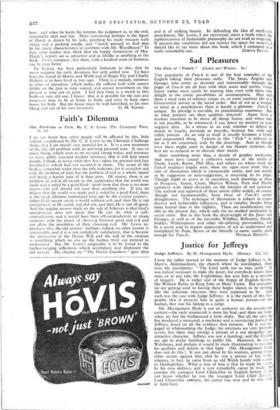Faith's Dilemma
I Do not know how other people will be affected by this little volume contributed by Mr. C. S. Lewis to the Christian Challenge' Series, b-at I am myself very grateful for it. It is a new treatment of the old, old problem with an arresting personal note. It says so many -things which seem to me-to need saying today, and traverses so many glibly repeated modern opinions, that it will help many people, I think, to revise what they have taken for granted and face possibilities which had not occurred to them. The scope of the' book is somewhat wider than the title indicates, for it considers not: only the problem of pain but the problem of evil as a whole, moral evil being a harder part of it than pain. Of course, there is no problem of evil at all except on the supposition that the world was made and is ruled by a good God: apart from that there is no more reason w hy evil should not exist than anything else. If you do believe that the world was made and is ruled by a good God, there is the stock dilemma formulated long ago by the ancient sceptics: either Gad cannot create a world without evil, and then He is not omnipotent, or He could, and did not, and then He is not all-good. And the regular answer made on the side of believers is that God's omnipotence does not mean that He can do what is self- contradictory, and it would have been self-contradictory to create creatures with the power of choosing between good and evil and, not allow the possibility of their choosing evil. Mr. Lewis re-, produces this, the old answer: perhaps, indeed, no other answer is conceivable, and if it is not completely satisfactory, that is because the interaction of the Divine Will and the will of the creature is something which no one on the human level can pretend to understand. But Mr. Lewis's originality is to be found in the farther-ranging reflections which accompany and illuminate the old answer. His chapter on "The Divine Goodness" goes deep
and is of striking beauty. In defending the idea of retributive punishment, Mr. Lewis, I am convinced, states a truth which the sophistications of fashionable philosophy do not avail to evaporate. If present-day conditions did not restrict the space for reviews, I should like to say more about this book, which I commend as a


























 Previous page
Previous page